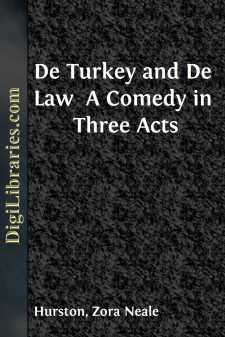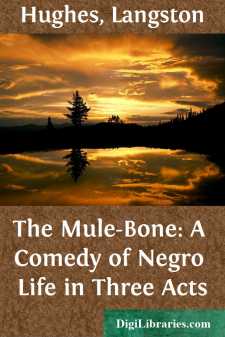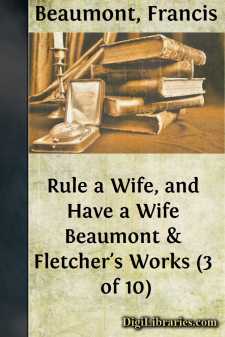Drama
General Books
Sort by:
by:
Robert Garnier
Sieur du Pleßis Marly. T seemes to mee strange, and a thing much to be marueiled, that the laborer to repose himselfe hasteneth as it were the course of the Sunne: that the Mariner rowes with all force to attayne the porte, and with a ioyfull crye salutes the descryed land: that the traueiler is neuer quiet nor content till he be at the ende of his voyage: and that wee in the meane while tied in this...
more...
CAST Jim Weston A young man and the town bully (A Methodist) Dave Carter The town's best hunter and fisherman (Baptist) Joe Clarke The Mayor, Postmaster, storekeeper Daisy Blunt The town vamp Lum Boger The Marshall Walter Thomas A villager (Methodist) Lige Moseley A villager (Methodist) Joe Lindsay A villager (Baptist) Della Lewis A villager (Baptist) Tod Hambo A villager (Baptist) Lucy Taylor A...
more...
by:
Percival Wilde
THE NOBLE LORD A secluded spot in the Maine woods in the neighborhood of a summer hotel. It is the middle of July. The trees are covered with foliage, a hot sun casts dancing shadows upon the mossy ground, and the air is full of the twittering of birds and the rustle of leaves. A winding path crosses from one side to the other, and near the center is a little clearing: the stump of a felled tree, with...
more...
by:
Langston Hughes
CHARACTERS JIM WESTON: Guitarist, Methodist, slightly arrogant, agressive, somewhat self-important, ready with his tongue. DAVE CARTER: Dancer, Baptist, soft, happy-go-lucky character, slightly dumb and unable to talk rapidly and wittily. DAISY TAYLOR: Methodist, domestic servant, plump, dark and sexy, self-conscious of clothes and appeal, fickle. JOE CLARK: The Mayor, storekeeper and postmaster,...
more...
THERE ARE CRIMES AND CRIMES INTRODUCTION Strindberg was fifty years old when he wrote "There Are Crimes and Crimes." In the same year, 1899, he produced three of his finest historical dramas: "The Saga of the Folkungs," "Gustavus Vasa," and "Eric XIV." Just before, he had finished "Advent," which he described as "A Mystery," and which was published...
more...
PREFACE Believing plays to be solely for the stage, I have never before allowed any of mine to be printed until they had first faced from a stage the judgment of an audience, to see if they were entitled to be called plays at all. A successful production also has been sometimes a moral support to me when some critic has said, as for instance of "A Night at an Inn," that though it reads passably...
more...
by:
Edwin Bjorkman
This is one of the three plays which Strindberg placed at the head of his dramatic production during the middle ultra-naturalistic period, the other two being "The Father" and "Miss Julia." It is, in many ways, one of the strongest he ever produced. Its rarely excelled unity of construction, its tremendous dramatic tension, and its wonderful psychological analysis combine to make it a...
more...
by:
Booth Tarkington
THE FIRST ACT SCENE: The terrace of the Hotel Regina Margherita, on the cliff at Sorrento, overlooking the Bay of Naples. There is a view of the bay and its semi-circular coast-line, dotted with villages; Vesuvius gray in the distance. Across the stage at the rear runs a marble balustrade about three feet high, guarding the edge of the cliff. Upon the left is seen part of one wing of the hotel,...
more...
by:
Hermann Hagedorn
SCENE I A room in the Ministry of War in the capital of Iberia. Evening. The minister of war, a tall, stern, bearded man with deep-set eyes and many furrows, is sitting at a large, mahogany desk-table, Left. The chief of staff, silent, motionless and watchful, stands beside him with his hands resting on the table-top. He is thin, old and emaciated, clean-shaven, firm-lipped, and looks startlingly like...
more...
by:
Francis Beaumont
Actus PrimusScena PrimaEnter Juan de Castro, and Michael Perez. Michael PerezAre your Companies full, Colonel? Juan de CastroNo, not yet, Sir:Nor will not be this month yet, as I reckon;How rises your Command? Michael PerezWe pick up still, and as our monies hold out,We have men come, about that time I thinkWe shall be full too, many young Gallants go. Juan de CastroAnd unexperienced,The Wars are dainty...
more...











